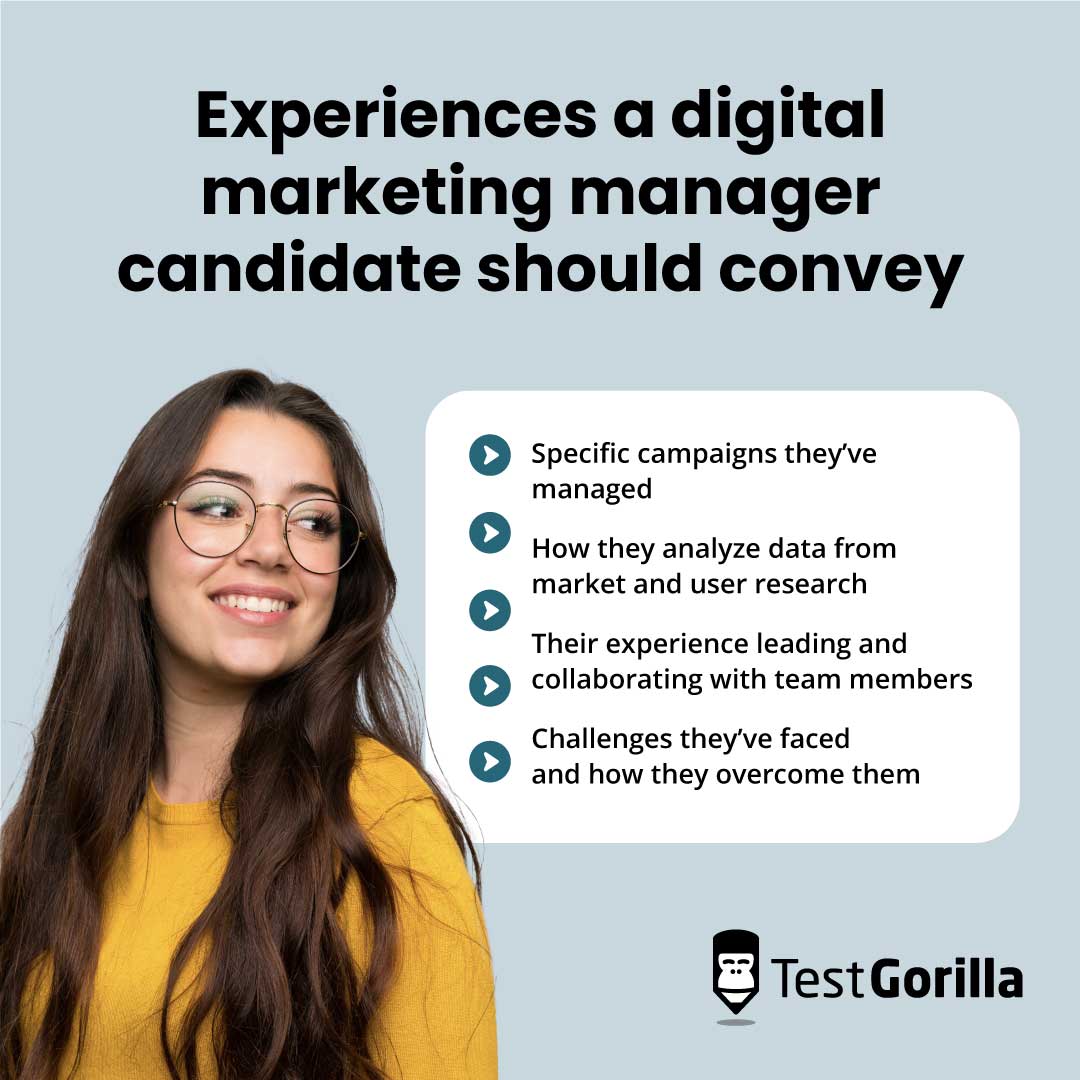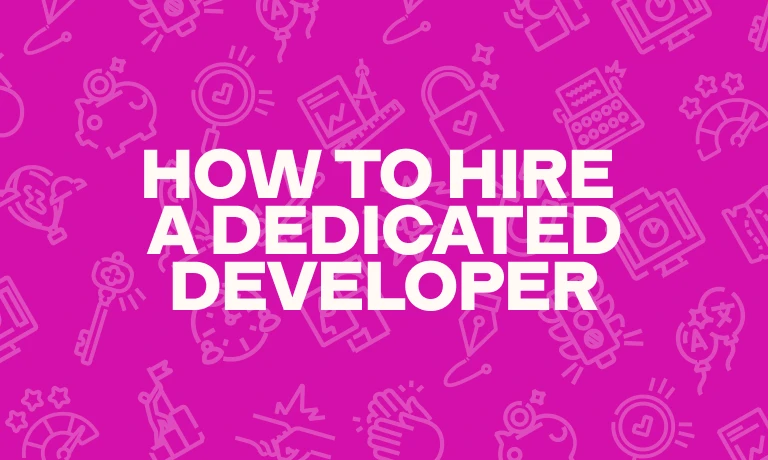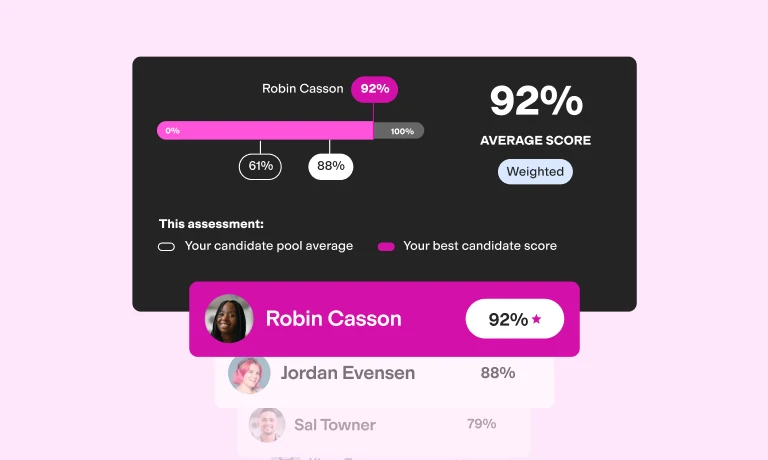13 questions to ask in a digital marketing manager interview (with answers)
Knowing which questions to ask in your digital marketing manager interviews is essential to identifying the perfect candidate for your company. Otherwise, you risk hiring the wrong person, which can have serious consequences – from mismanaged marketing campaigns, blown budgets, and even a damaged company reputation.
In this guide, we share 13 questions to ask in a digital marketing manager interview, each with example answers. We also explain how to combine interview questions with tests for marketing managers to evaluate your candidates and select the best of the bunch to bring aboard your team.
What are digital marketing manager interview questions?
The questions you ask during a digital marketing manager interview are specifically designed to provide insight into candidates’ experience managing campaigns and implementing new strategies in digital marketing.
Digital marketing manager interview questions go beyond candidates’ resumes by asking them to speak about:
Specific campaigns they’ve managed – including the approach they took, the key performance indicators (KPIs) they prioritized, and the outcomes
How they analyze data from market and user research
Their experience leading and collaborating with team members to ensure campaign success (and a positive work environment)
Challenges they’ve faced and how they overcome them, which can help you assess candidates’ problem-solving skills and conflict-resolution abilities
These questions can give you a more well-rounded view of each candidate’s skills, behavioral traits, and aptitudes so you can hire the best marketing professional for your company.
13 digital marketing manager interview questions and answers
The following questions show possible candidate answers that may give you an idea of how they used their skills in real-life scenarios.
1. Describe a recent marketing campaign you led that produced exceptional results. What strategies did you use? What were the outcomes?
Candidate answer: “In a recent campaign, I first conducted extensive market and customer research. Then, I used those insights to optimize social media ad placements and personalize email outreach. This resulted in a 50% increase in conversion rates and a 70% spike in customer engagement compared to previous campaigns.”
2. What tactics do you use to stay updated on the latest marketing trends and technologies?
Candidate answer: “I attend industry events, participate in various digital marketing communities online, and follow several marketing publications to read thought leadership pieces and news articles. Also, I complete a marketing workshop twice yearly to stay updated on emerging trends and technologies. “
3. Describe a time when you had to reallocate a digital marketing budget. How did you optimize resources?
Candidate answer: “In a previous campaign, 60% of the digital marketing budget was designated for paid search and website advertising. However, our target customers weren’t engaging with these strategies and were more interested in social media content. So, we reallocated part of the original budget for paid search and website advertising to social media advertising.
To optimize our new budget, I used market and customer behavior research to identify the social media platforms that our target audience was most likely to use. Then, I monitored campaign performance and adjusted the budget – e.g., increasing it for ads on platforms generating more user engagement – in real time.”
4. Can you describe a digital marketing project that faced unexpected challenges? How did you ensure success?
Candidate answer: “A recent digital marketing campaign I led faced time constraints due to a sudden product launch announcement. I instructed my team to prioritize collaboration and expedite execution.
Specifically, I broke tasks into smaller parts and set short-term deadlines for each. Then, I assigned them to my team members and paired individuals together so they could assist each other as needed. I also streamlined my decision-making process and regularly updated relevant stakeholders so everyone was on the same page regarding progress.
Ultimately, these efforts ensured we met the product launch deadline and succeeded in our marketing goals.”
5. What key performance indicators (KPIs) do you focus on in digital marketing campaigns, and why?
Candidate answer: “These are the KPIs I prioritize:
Customer acquisition cost (CAC) - As the name suggests, this is the cost required to acquire a new customer. This helps inform campaign budgets pre-launch and campaign profitability post-launch.
Customer lifetime value (CLV) - This metric measures the revenue a customer is expected to generate over their lifetime with a brand. Knowing this information helps me tailor digital marketing strategies to improve customer retention and increase revenue opportunities.
Conversion rate - This represents how many visitors complete a desired action, like signing up for a free trial. By assessing campaign results against this KPI, I can assess the effectiveness of the campaign strategies and improve them in future campaigns.
Click-through-rate (CTR) - The percentage of users who click on a link, which helps me measure engagement with an ad or other call to action.”
6. How do you approach competitor analysis?
Candidate answer: “First, I identify the brand’s key competitors through market research, and then I evaluate their digital presence. I evaluate their marketing strategies, like social media ad placements, and see how highly they rank in search results on sites like Google. I also carefully assess their content and tactics for engaging their audience.
Importantly, I look for weaknesses and strengths. This enables me to identify potential threats to my campaign’s success and marketing opportunities my team and I can capitalize on.”
7. How have you used marketing automation tools and other software and tech?
Candidate answer: “I’ve used marketing platforms like HubSpot and Mailchimp to automate repetitive tasks and personalize large-scale customer communications. These tools have helped me conduct email campaigns, social media scheduling, and lead nurturing – ultimately boosting conversion and engagement rates in my campaigns.
I’ve also used customer relationship management software alongside dedicated digital marketing tools. These solutions offer great oversight of customer interactions and have helped personalize the customer experience.”
8. How do you adapt digital marketing strategies for different stages of the buyer’s journey (awareness, consideration, decision)?
Candidate answer: “At the awareness stage, I focus on providing informative content that engages the target audience and speaks to their pain points. This content can include videos, social media posts, blog articles, and more. I emphasize search engine optimization (SEO) at this stage to maximize reach.
During the consideration stage, I focus on affirming the brand as a solution for the audience. I might use email campaigns, re-targeting ads, case studies, and comparison content to do so.
Finally, the decision stage is about converting individuals into customers. I focus on lead nurturing and personalized recommendations, as well as using testimonials, free trials, limited-time offers, and demos to highlight the brand and its offerings.”
9. What’s your strategy for optimizing website and landing page conversion rates?
Candidate answer: “I focus on data analysis, A/B testing, personalizing content according to user research, and working with UX designers to optimize the customer experience.
Specifically, my strategy involves optimizing the placement of calls to action, making website forms sleek and easy to fill out, and evaluating funnels for potential improvements to drive conversions.
I also emphasize SEO, social proof integration, and continuous iteration.“
Dive deeper into marketing analysis interview questions that go beyond the basics to understand how a marketing analyst really thinks.
10. How would you approach establishing and maintaining a strong brand presence across digital marketing channels?
Candidate answer: “First, I would establish a clear definition of the brand’s identity and its audience. I would use audience segmentation to help create tailored content, then focus on search engine and search engine marketing optimization to boost visibility.
Using various social media channels, partnering with influencers, and conducting email campaigns would also be key to my approach.
In addition, I would establish strategic collaborations, remain consistent in the brand’s messaging across all channels, and regularly assess data to iterate and improve my strategies.“
11. How do you adapt strategies for different global markets?
Candidate answer: “The first step is conducting comprehensive market research. This enables me to understand differences in consumer behavior across various cultural and economic landscapes. I’ll then use this information to select the marketing strategies I’ll implement, create tailored messaging and content, and use SEO to ensure brand visibility and strong user engagement.
Where possible, I’ll create connections with local teams or experts in other global markets to better understand the target audience and adjust my tactics accordingly.”
12. Tell me about a time when you had to handle a marketing or reputation management crisis. How did you restore trust?
Candidate answer: “In a previous position, there was a product recall crisis. My team began by communicating the situation clearly and honestly with the rest of the organization and with our customers.
We ensured consistent messaging across various channels and prioritized customer support to answer questions and address concerns swiftly. We also kept customers informed of the steps we were taking to resolve the issue.
We gathered customer feedback to improve the product, and going forward, we focused on preventative measures to avoid another product recall.”
13. How do you foster innovation in your digital marketing team?
Candidate answer: “I greatly emphasize transparency and inclusivity, which sets the foundation for an innovative, productive team. When everyone feels included, they’re more likely to share their ideas—even the ones that may not stick—because they don’t fear harsh criticism.
Additionally, I hold regular one-on-one and group meetings with my team to gather feedback, exchange ideas, and brainstorm strategies and approaches for current and upcoming campaigns.
Lastly, I ensure my team has access to professional development opportunities, like workshops and certification courses, to keep them skilled and knowledgeable.”
The best insights on HR and recruitment, delivered to your inbox.
Biweekly updates. No spam. Unsubscribe any time.
How to assess a candidate’s marketing and managerial skills
While resumes and interviews offer valuable insights, they don’t reveal everything you need to know to make the right hire. Incorporating pre-employment assessments into your hiring process gives you an objective way to measure candidates’ skills and aptitudes.
Various pre-employment assessment platforms exist, but TestGorilla stands out with a library of more than 300 scientifically backed tests – including a dedicated catalog of digital marketing manager tests. You can combine up to five tests and add custom questions for a personalized assessment.
Here are some tests you can use to evaluate your digital marketing candidates:
TestGorilla’s Branding Strategy test, which measures individuals’ ability to define brand identity and positioning and develop an approach to improve brand awareness
Our Google Ads test and Google Analytics test, which evaluate candidates’ knowledge of using Google Ads for paid and search campaigns and Google Analytics to assess campaign performance data
TestGorilla’s Technical SEO test that offers a way to objectively measure your candidates’ skills in assessing website and page performance and boosting their ranking in search engine results
Our Leadership and people management test to evaluate candidates’ ability to lead a team, delegate tasks and authority, provide feedback, support others’ growth, and earn buy-in for ideas
Personality tests so you can understand your digital marketing manager candidates’ behavioral traits and determine whether they’d mesh well with your team
Soft skills tests, including our Communication skills test, Problem Solving test, Time Management test, and more
TestGorilla also provides the following test collections for other marketing professionals:
Email marketing test to help you measure how well a candidate can lead your email campaigns
Product marketing management test to determine whether candidates have the broad skills needed to launch and market your products
Hire top digital marketing managers with TestGorilla
In today's competitive job market, identifying the right talent is crucial. A key step in finding the perfect digital marketing manager for your team is asking the right questions in your interviews.
You can use the 13 questions outlined in this guide to get started. Then, combine them with pre-employment assessments from TestGorilla so you can accurately evaluate your candidates and reduce the risk of mis-hiring.
Get started with TestGorilla by signing up for a free live demo, watching our product tour, or creating your free account today.
Related posts
You've scrolled this far
Why not try TestGorilla for free, and see what happens when you put skills first.



















